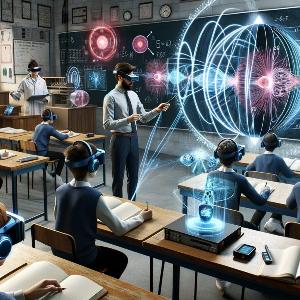CESAR
Supporting conceptual understanding through augmented reality experiments on the topic of electromagnetism.

Supporting conceptual understanding through augmented reality experiments on the topic of electromagnetism.

A fundamental goal of science education is the development of abstract scientific concepts. Guided inquiry-based learning activities and learning with multiple external representations (MER) can support students in this.
Four studies will investigate which AR-induced external representations are best suited to support learning and how they interact with the level of guidance during experimentation.
Augmented reality (AR) enables spatial and temporal integration of MER during experimentation and thus reduces the overall cognitive load. Using the example of electromagnetism and the Lorentz force, we use the potential of AR to successively create an optimized learning environment that combines MER and guided experimentation.
Study 1 examines which MERs best support conceptual knowledge and representational competence in high-guidance experimentation. The focus here is on the direction of the Lorentz force. In two further studies, the magnitude of the Lorentz force is addressed in student experiments:
Study 2.1 varies the type of MER, and Study 2.2 examines how the combinations of AR-induced representations found to be best interact with the amount of experimental guidance (high vs. low).
In Study 3, the findings from the first three laboratory studies will be transferred to the classroom to test the best combination of conditions in a field study. To gain insights into students' visual and cognitive processes responsible for successful learning with MER during experimentation, we will record students' eye movements during experimentation, analyze their workbooks, and capture their cognitive load. We expect that this series of studies will provide important insights into how the still-developing AR technology can be used to create optimized learning environments in science education.